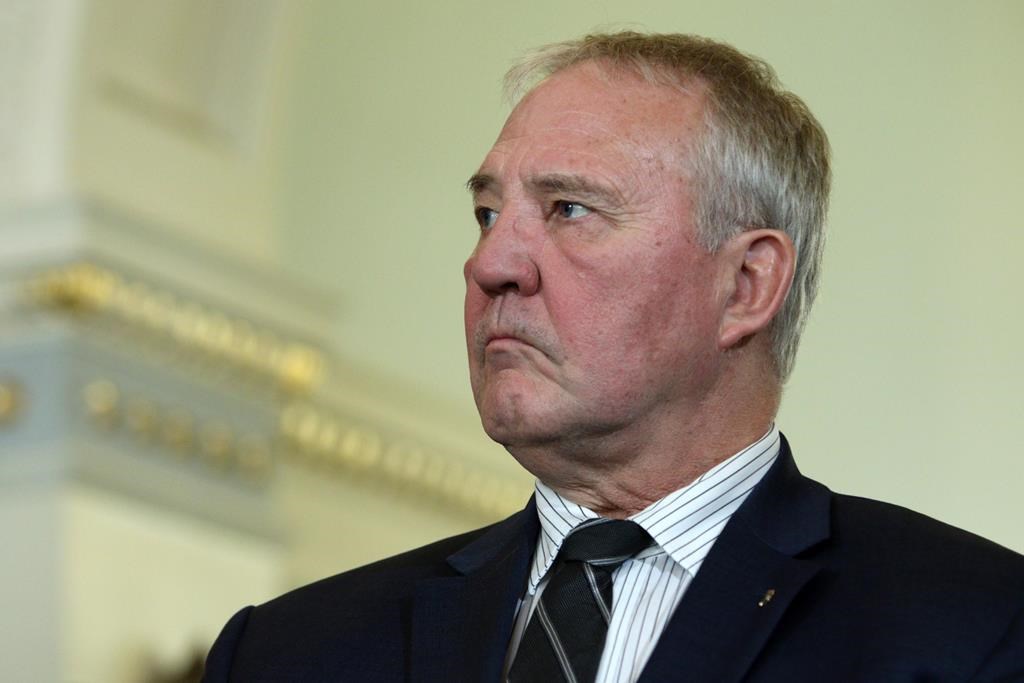When announcing a second cannabis lottery, Ontario’s Attorney General and Finance Minister blamed a lack of federal cannabis supply for the restricted number of cannabis licences in the province.

But Canada’s minister of border security and organized crime reduction, Bill Blair, says Ontario politicians are “making excuses” for their slow progress in minimizing illegal cannabis sales, while other provinces are making great strides
“With the notable exception of Ontario, the rest of the country has made steady progress in displacing the illicit market with licenced and regulated retail stores,” Blair said in an emailed statement.
On Wednesday, Rod Phillips, minister of finance, and Doug Downey, attorney general, announced the AGCO would be holding another cannabis lottery, which will award 42 new cannabis retail licences across Ontario. Interested parties will be able to apply online in this summer, according to a news release.
WATCH: Cannabis taxes brought in $186 million since legalization

Eight other licences will be granted to stores on First Nations reserves — licences that will be dealt with first come, first serve, rather than through the lottery.
The province says the second lottery will be new and improved. The first round, conducted in April, was criticized for choosing candidates who were unprepared to open stores.
Supply and demand issues
In a news release announcing the second cannabis lottery sent out on Wednesday, both Phillips and Downey said curbing the influx of cannabis stores was necessary due to national supply issues.
Phillips, in a statement, said national supply had seen only “marginal improvements,” which is why the province capped the next lottery at 50 licences. Downey expressed a similar sentiment.
“While the federal supply issues persist, we cannot in good conscience issue an unlimited number of licences to businesses. A phased-in approach remains necessary,” Downey continued in a statement.
The office of the attorney general did not respond in time for publication when asked what supply issues were plaguing Ontario cannabis sales.
Emily Hogeveen, the minister of finance’s press secretary, did not elaborate on what the exact supply issues were, but rather doubled down on the Phillips’ statement.
“We urge the federal government to take steps to quickly increase the supply of recreational cannabis so that we can continue combating the illegal market in Ontario. Rather than ignoring the national supply challenges, Minister Blair should focus on the federal Government’s responsibility to improve legal supply.”
WATCH: Coming soon to a store shelf near you: edibles and other cannabis products

Health Canada has acknowledge that since legalization in October 2018, stores across the country have complained they were selling out of dried cannabis products faster than the government could ship it.
“The supply of cannabis is not the issue. The issue is the supply chain, in other words, converting raw product into packaged goods and moving it to distributors or retailers and to customers,” Tammy Jarbeau, a spokeswoman for the government agency, told Canadian Press for a previous story.
But Darren Bondar, president and CEO of Spiritleaf, a cannabis company that operates several stores in western Canada and one retail location in Kingston, Ont., says although there were supply issues at the start, those issues are subsiding.
“Everybody needed some time to ramp up, to get accustomed to the packaging and the processes to to get cannabis to the market. Companies seem to have now figured that out,” Bondar told Global News.
“I think this supply discussion is a thing of the past and will likely change to an oversupply issue.”
Bondar says especially in Alberta, where there is no cap on the number of licenced stores in the province, in recent weeks, as many as 20 licences have been granted in a week, and he expects the national supply will be able to support the demand.
The Alberta Gaming, Liquor and Cannabis Commission did not respond when asked to verify Bondar’s licensing numbers.
“The data is clear”
Statistics from the government of Canada show that since legalization, national supply has far surpassed medical and commercial sales across the country.
A Health Canada spokesperson said at the end of April 2019, total inventories for dried cannabis were 24 times the total sales for the month, whereas inventories for cannabis oil was over 14 times the total sales in April.
“The data is clear: there remains enough supply to meet and exceed combined retail sales,” Blair said in a statement.
Blair went on, saying since legalization, the Ontario government has been blaming issues with their “inept approach” to cannabis sales on a “non-existent supply shortage.”
Ontario’s cannabis lottery system
Unlike other provinces, in late 2018, when recreational cannabis was legalized, Doug Ford‘s newly elected Progressive Conservative government decided to switch gears and exclusively sell cannabis online through the provincially-run Ontario Cannabis Store.
In April 2019, the province ran a cannabis licensing lottery through the AGCO, which randomly chose 25 applicants among the thousands who applied.
Some of those stores were not ready to open by the April 1 deadline. Three months after Ontario cannabis stores were legally allowed to open, three licence winners have yet to open their doors.
WATCH: Double standards as government unveils edible cannabis rules

The Ontario government says the new lottery will have new pre-qualification stipulations that will “streamline the licensing process.”
Unlike the previous lottery, the second run will require prospective licensees to have retail spaces secured and ready to operate by October, 2019.
Also, licenced stores will not be restricted to set up shop in municipalities larger than 50,000 people.
Bondar says Spiritleaf has already secured 20 locations across Ontario in anticipation of the second lottery, and on the promise that Ontario will revoke the provincial cap on cannabis retail licences once cannabis sales stabilize in the province.
“I hope that they stick to their mandate … of just opening it up to people to be able to apply naturally,” Bondar said.
As for Blair, he says he’s happy to see the province has “resolved their issues of mismanagement.”
“We wish them every success,” Blair finished





Comments